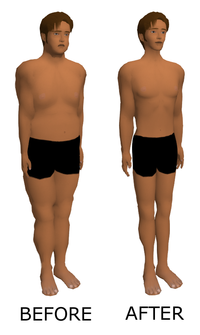
Photo from wikipedia
Background Weight loss maintenance is a complex and an enduring problem. A substantial amount of research and subsequent treatments have been based on behavioural and medical interventions with limited success.… Click to show full abstract
Background Weight loss maintenance is a complex and an enduring problem. A substantial amount of research and subsequent treatments have been based on behavioural and medical interventions with limited success. Much less is known regarding reliable psychological predictors of successful weight maintenance, especially those related to the field of positive psychology that aims to improve health and happiness. This cross-sectional study is among the first to explore the positive psychological differences between successful maintainers (defined as losing 10% body weight and maintaining this for at least 12 months) and non-maintainers in a non-clinical Australian population. Method Participants were 250 Australian residents, aged between 18 and 65 years, who had attempted to lose weight over the last 12 months. An online survey method recorded satisfaction with life, positive and negative affect, gratitude, flourishing, strengths, and hope. Results Results suggest there are significant differences in some positive psychological variables between successful maintainers and non-maintainers in this population. Maintainers reported significant differences in frequency of positive mood and the agentic thinking component of hope, both correlates of psychological health. In addition, maintainers engaged in more frequent diet, exercise, and self-weighing behaviours in comparison with non-maintainers. Conclusions Given the lack of success regarding weight maintenance in general, it may be important to recognise that in addition to the 10% weight loss recommended for better physical health, the addition of specific behavioural and positive psychological variables to existing treatment protocols may improve mood and motivation, in the service of encouraging more effective weight maintenance behaviour.
Journal Title: Clinical Psychologist
Year Published: 2017
Link to full text (if available)
Share on Social Media: Sign Up to like & get
recommendations!